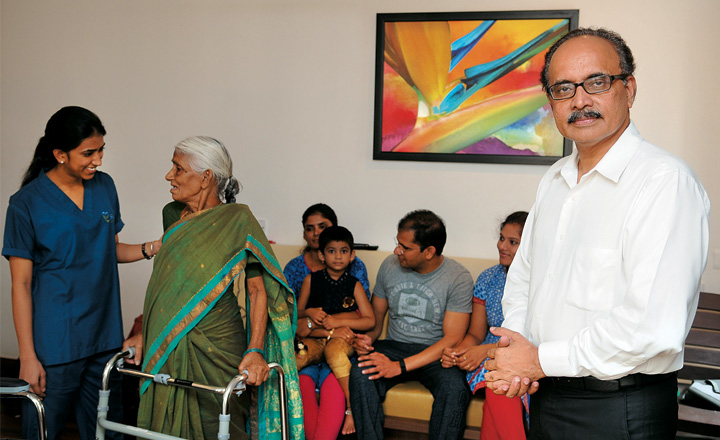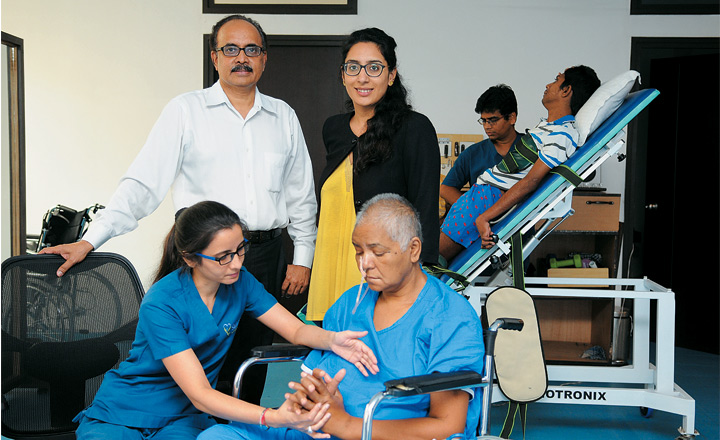The very thought of a hospital instantly brings up painful and unpleasant memories. And if you find yourself in a hospital because of some unfortunate circumstance, you are always counting the days as to when you can get back to the comfort of your home. But going home doesn’t always help in complete recovery. For patients, who are on the path of recovery after serious illness and require minimal medical supervision to get back to normalcy to carry out their daily activities, a transitional care facility is an ideal place to go. A transitional care facility offers the continuation of the healthcare set-up of a hospital in a home-like environment to facilitate complete and faster recovery. Hyderabad-based transitional care provider, SuVitas, has been a pioneer in this space in India.
SuVitas was co-founded in May 2015 by Sateesh Andra, managing director, Endiya Partners, a venture capital and private equity fund; Ramesh Byrapaneni, founder, Medwin Hospitals, and Lieutenant Bipin Chandra Pendyala. While Pendyala quit the organisation, both Andra and Byrapaneni are striving to make patients’ post-hospitalisation phase efficacious.
Bright idea
The idea struck Andra when his mother had a knee replacement surgery and found it difficult to return home after a brief stay in the hospital, as she had not completely recovered. They had to make alternate arrangements for her stay at a comfortable place. When he found that a system like the transitional setup does not exist in India, unlike in the US, it led him to start SuVitas along with Byrapaneni. Both Byrapaneni and Andra together made an initial investment of Rs.6 crore in the company.
“There is a huge gap between hospital and home care,” says Byrapaneni. And that’s the gap SuVitas, which combines ‘Su’ (‘good’ in Sanskrit) and ‘Vita’ (‘life’ in Latin), wants to fill.

SuVitas is building its model on the American transition care model. The US government has made it mandatory for patients, who need intensive care, to go to transitional care homes, with a skilled nursing facility in a proper medical environment, after hospitalisation. This has helped in improving hospital outcomes in the US owing to low re-admission rates.
For SuVitas, the system has been conceptualised and designed to suit Indian needs by Dr Vijay Janagama, a diabetologist and wellness practitioner in Hyderabad. The patients here, are referred to as ‘residents’. Once the intensity of the care is identified, the duration of the stay is determined depending on the recovery rate. On an average, a resident may stay up to two weeks or till they feel that they can do things on their own.
“In the first week of transitional care, we counsel the patients, educate them about the disease in detail and also tell them how they could avoid a relapse. Once they are better educated and equipped, we send them home,” explains Byrapaneni.
Under one roof
During their stay, the residents are given holistic care including skilled nursing, occupational therapy, physiotherapy and speech therapy depending on the case requirements. “Neurology, early-stage oncology, orthopedic and cardiology specialists form the core team at SuVitas. Physiotherapy, emotional wellness and skilled nursing are our backbone services,” says Janagama. The residents are also involved in various activities such as recreational therapy that includes music, dance and yoga. The dieticians and nutritionists chart out the patient’s daily meals to ensure they follow a healthy diet. Family members of the residents are often asked to stay with the patients in the wards and, there are no visiting hours.
The broader aim is to facilitate the resident’s physical, cognitive and social development. “By the time a resident leaves the care, our aim is to empower them, so that the risk factors are reduced, and make them independent,” adds Janagama.
The post-hospitalisation rehabilitation process requires maximum effort from nurses. Hence, SuVitas ensures that they are involved in orientation and training before putting them on board. “They are our driving force. We ensure that they are passionate and responsible to make a positive impact on residents,” says Byrapaneni. He further adds that a patient’s overall quality health is the ultimate goal. “The idea is not only about complete recovery; it is to help residents go home and take care of themselves.”
Dual advantage
While SuVitas ticks all the right boxes for patients, transitional care can be a boon for hospitals in India as well — both in improving hospital outcomes by reducing re-admission rates and reducing the average length of stay (ALOS) of patients, which improves overall realisations and productivity of hospital assets. Tertiary-care hospitals like Apollo, Fortis and Max are specialists in providing critical and acute care. They also provide rehabilitation for chronic patients or those recovering from critical illnesses. The costs, however, are prohibitive for patients and not an optimum use of hospital resources. Having a transitional care provider like SuVitas would free hospital beds for more acute-care patients, creating a win-win situation for both patients and hospitals. SuVitas is eyeing to tie up with leading hospitals in Hyderabad and is also exploring the possibility of running a transitional care facility within the hospital premises.
Which brings us to the next question — how does SuVitas differentiate itself from the mushrooming breed of home healthcare providers such Portea Medical, Dabur’s Health Care at Home India, India Home Health Care and even Apollo Hospitals’ home healthcare service? According to Byrapaneni, they don’t see home healthcare providers as competitors, but as complementary sources. Home healthcare providers step in where transitional care ends. Experts, however, feel that the transitional healthcare systems might pose a threat to smaller nursing homes in India. “This is going to be an asset-intensive play over time. They are trying to take some buzz off from smaller nursing homes which can lead to a decline in nursing homes, and this may not be a good thing for the healthcare system in India,” thinks Sameer Mehta, director, Dr Mehta’s Hospitals, who also doubles up as the promoter of India Home Health Care.
Low cost is something which SuVitas wants to cash on. The basic cost of a ward for one person per day starts at Rs.5,000 and goes up to Rs.7,000, depending upon the intensity of the treatment. Even after adding all the other charges for services rendered, Byrapaneni says that the cost of the transitional care set-up is one-third the cost of a multi-specialty hospital service. While the company declined to disclose its revenue, media reports peg its monthly revenue to be around Rs.20-25 lakh per month.
Treading ahead
Currently, SuVitas is present only in Hyderabad, but after having treated more than 250 patients in its first year, it is looking to expand its footprint. Their second centre, coming up in Bengaluru, will begin operations by June 2017. SuVitas also plans to set up new centres in Mumbai and Chennai. The new centres, which would have around 50 beds each, will be set up at an investment of nearly a million dollars, bootstrapped with Byrapaneni and Andra’s personal funds. Every centre will have about 60-70 employees including four doctors, over 20 nurses, 10 therapists (including a dietician and a psychologist), along with 30 support staff members to cater to the patients. The company is hoping that their Hyderabad centre will break even by May this year. “The break-even period may vary in each centre as it depends on the local eco-system,” feels Antra Bhargava, a core team member at SuVitas.
One of the challenges that SuVitas will face, as they scale up, is the lack of awareness among people about the importance of a transitional care post hospitalisation. “When a doctor suggests transitional care as post-hospitalisation recovery option, most patients decline preferring to go home and rest, rather than spending money on another healthcare set-up,” says Byrapaneni. Since some nurses or ward boys from hospitals offer to extend their services at the patients’ residence at a cheaper rate, they tend to reject the idea of transitional care. On top of that, the fact that transitional care is still not yet covered under insurance — like home healthcare — is also hindering its adoption. Like home healthcare providers, who are batting for insurance cover, SuVitas expects more people to turn towards transitional care if it is covered under insurance. Mehta, however, feels that a change in terminology can also help it flourish. “The term ‘transitional healthcare’ is nothing but just a continuation of the healthcare post hospitalisation. If you call it ‘home healthcare’, for example, you have better chances of building your market,” he says.
But right now, the focus is on building its presence in the next three metros and creating awareness. “We believe we should be successful in these markets. We understand the psyche of people in these places. So, this will remain our focus in the short and medium-term,” adds Byrapaneni. Transitional care is the latest healthcare phenomenon to hit the Indian shores. Reaping the first-mover advantage in this space has definitely placed SuVitas in a position of strength. An ageing population increasingly suffering from chronic diseases, higher income levels which increases the affordability of these services, and a burgeoning pressure on hospitals to attend to more critically-ill patients will ensure that a transitional care provider, like SuVitas, is able to carve a niche for itself in the country’s healthcare value chain.











